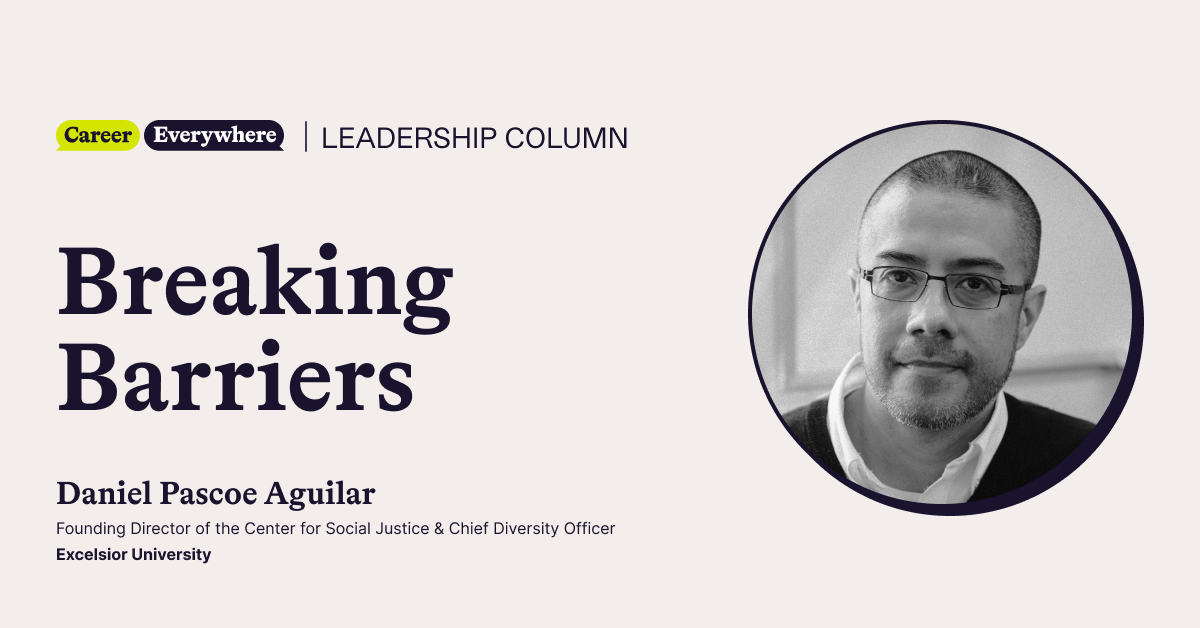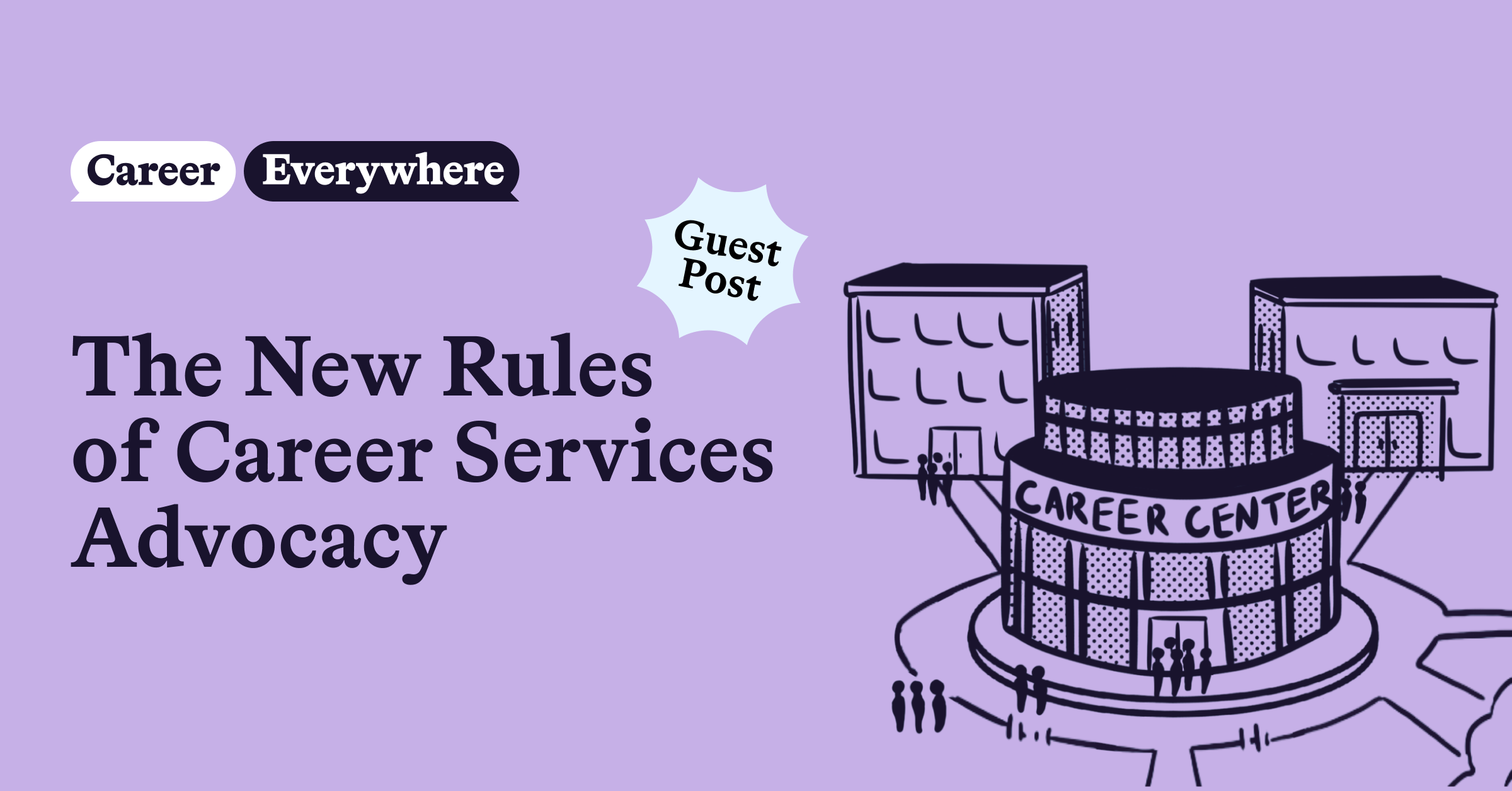
Welcome to the second edition of Breaking Barriers, a biweekly leadership column for career services professionals! Featuring insights, advice, and inspiration on preparing the next generation of diverse leaders from Daniel Pascoe Aguilar, a 20-year leader in career services and higher education.
After calling career professionals to lead systemically in my first column, I thought that before getting into the how or what of our critical leadership, I should focus my second column on the why of our work.
In my first piece, I referred to my perspective on our why as our need to facilitate the preparation of a diverse, authentic, purposeful, and ready next generation of leaders for our urgent and collective response to our social and global challenges and the development of a better reality. In my experience, however, I have found that to explore the intrinsic why of our work, introspective exploration of our perspective and purpose is key to our effectiveness.
Seminal philosophers, such as Egon Guba, Yvonn Lincoln, Thomas Kuhn, Robert Stake, and others argue that, regardless of our explicit awareness of it, we all function based on a paradigm we have prioritized. And our acquaintance with and exploration of this paradigm is foundational to our authenticity, focus, accuracy, and transparency in who we are and what we do.
Kuhn proposed that a paradigm is a “framework of concepts, results, and procedures within which work is structured,” but a paradigm does not prescribe a rigid approach. Rather, it can be applied creatively to any effort. Put in simpler terms, the Merriam-Webster online dictionary defines a paradigm as a philosophical or theoretical framework within which theories, principles, generalizations, and their applications are formulated. More concretely, Guba and Lincoln defined a paradigm as the collection of our a) ontology or from where we come, our b) epistemology or what is true to us, our c) axiology or what is worth our investment, and our d) methodology or how we want to pursue our epistemology and axiology.
Based on this, my question in this column is: What is your paradigm? How would you define the paradigm that brings meaning to what you do, the paradigm that guides your approach to your work? In my experience, work or leadership without clear definition of our paradigm could lack authenticity, focus, accuracy, and transparency. So I believe in and strongly recommend taking the time to define our ontology, epistemology, axiology, and methodology as we perform and lead our critical efforts.
Find the time to reflect on the elements of your paradigm by answering the following questions:
- Where have you come from or what is your departing point for your work? In other words, what has made you the leader you are, or what defines the foundation on which you base your why?
- What do you believe to be true or what is your truth? From what perspective do you approach your work, or on what truth do you ground your leadership and what you do?
- Based on your answers to questions one and two, what cause or purpose matters to you, to your leadership? What do you believe to be worth your efforts or investment?
- How do you want to pursue your purpose? What methods or leadership principles should you implement to accomplish your cause?
Earlier in my career, I had the opportunity to participate in a powerful workshop facilitated by Spencer Niles, a seminal leader and author in the career development field. During the session he facilitated a simple but, in my mind, profound exercise I believe applied all the concepts above. So, although I still recommend taking time to explore the paradigm constructs and questions above, put them on hold for a moment and reflect on Nile’s exercise:
Imagine you are writing a book about your life—and in this case about your leadership. It’s a book made of five chapters. The first three chapters are about foundational stages or aspects of your past. What three experiences, relationships, or beliefs would you share to define what has made you the leader or who you are today?
Once you’ve identified and made note of the content or titles of each of the first three chapters of your book, then think of your two remaining chapters. Chapters four and five are about what is next for your leadership and for the community that matters to you. What are your short-term and long-term next steps for your efforts, the growth of your community, and your development as a leader?
Finally, once you’ve identified and made note of the content or title of chapters four and five of your book, reflect on and write down the title of your book.
Whether you use the philosophical constructs above or the book-about-your-life exercise to identify your paradigm and the paradigm of your leadership, make sure to approach your work with as much authenticity, focus, accuracy, and transparency as possible by reflecting on your why. Consider where you come from, what is true to you, what is worth your investment, and how you want to accomplish it. Or reflect on what would be the chapters and title of your book about your life or leadership.
The leadership necessary for our facilitation of one of our most important institutional and societal endeavors—the preparation of a diverse, authentic, purposeful, and ready next generation of leaders—depends on our strongest foundation.


